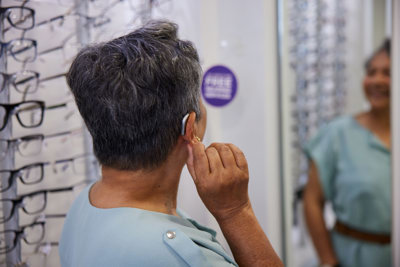
Overcoming Hearing Loss and Loneliness this Christmas
Communication Tips for a More Connected Festive Season
The festive season is a time for connection and enjoying time with family. But for many people with hearing loss, it can also be a time of frustration, isolation, and feeling left out. Following our recent accreditation as a Which? Recommended Hearing Aid Provider for 2025, we’ve created a survey of 1,000 people with hearing loss in the UK, to reveal the often-hidden challenges they face during the holidays. As we come together to celebrate, communicating freely and without barriers is essential to making sure we all feel included this Christmas.
Claire Saywell, Area Manager of Audiology & Head of Clinical Development at Bayfields, knows first-hand how hearing difficulties can impact our day-to-day lives and relationships. “Many people delay seeking help because they feel embarrassed or unsure,” says Claire. “But hearing loss doesn’t have to mean missing out. The festive season is about connection, conversation, and celebration. We encourage anyone experiencing hearing difficulties to get assessed and supported.”
For those facing hearing loss and loneliness, Claire and our team at Bayfields are here to offer advice and solutions that can make social gatherings more inclusive and enjoyable. By applying some simple communication tactics for hearing loss, we can ensure that everyone, no matter their hearing ability, can fully participate in conversations this festive season.
The Hidden Struggle of Hearing Loss and Loneliness
According to our survey, hearing loss and loneliness are more widespread than you might think, with 42% of people with hearing difficulties avoiding social events altogether. The emotional isolation leaves many feeling disconnected from family and friends during the most important time of the year. With nearly 75% of our respondents reporting feelings of isolation in social situations, it’s clear that hearing loss goes far beyond just physical discomfort, impacting relationships and the joy of shared moments.
90% of people we surveyed admitted to pretending to understand conversations, taking on an emotional strain that can become exhausting at times like Christmas. This is just one of many reasons why it’s so important to be prepared with some communication tactics for hearing loss as we approach the festive season. With just a few simple techniques, you can make any festive gathering much more inclusive, enabling everyone to participate fully and making sure no one feels left out.
Hearing Loss Communication Tips for Family Gatherings
Everyone deserves to enjoy the festive season to its fullest, and that includes people with hearing loss. That’s why our audiologists have put together their top 10 communication tips for hearing loss, that can transform how we connect with loved ones over Christmas:
1. Face the person and ensure good lighting
When talking with someone who has hearing difficulties, it’s important to face them directly and make sure the environment is well-lit. This not only helps with lip reading but also makes visual cues, like facial expressions, easier to understand.
"By positioning yourself face to face with good lighting, you're providing support that helps your loved one follow the conversation more easily," explains Claire. Whether it’s during a festive dinner or a casual conversation, simple adjustments like this can make all the difference in making everyone feel more comfortable.
2. Minimise background noise
Background distractions, such as the sound of a TV or radio, can make it much harder for people with hearing loss to become involved in conversations. By sitting away from noisy areas, you reduce these barriers and create a more focused environment.
"Simple actions, like choosing quieter spots to sit, can drastically improve the quality of communication," says Claire. This not only helps the person with hearing loss focus on the conversation but ensures that everyone involved can enjoy a more relaxed and connected gathering.
3. Speak clearly and naturally
Speaking at a moderate pace, without exaggerating words or shouting, helps people with hearing difficulties to process speech more effectively. "It’s about speaking clearly, at a natural pace, and avoiding over-exaggerated lip movements," Claire advises.
This simple change can drastically reduce listening fatigue and make conversations less exhausting for people with hearing loss. Especially during busy festive celebrations, keeping your tone natural and calm allows for a more inclusive environment where everyone can contribute comfortably.
4. Use names to get attention
In busy groups, it’s easy for someone with hearing loss to miss the start of a conversation, and struggle to join in as a result. To help, try saying peoples’ names before you begin speaking.
"By using names, you ensure that they’re prepared and focused on the conversation, which can make a big difference in avoiding misunderstandings," says Claire. A simple touch on the shoulder or a light wave can also serve as a gentle way to capture attention, allowing for a much more seamless back-and-forth.
5. Structure conversations simply
When communicating with someone who has hearing loss, keeping sentences short and clear can help immensely. Pausing between points ensures that they have time to process information. "It’s crucial to pause and check understanding. This reduces the risk of miscommunication, especially in a group setting," Claire suggests.
Taking your time to structure conversations can make social interactions smoother, ensuring everyone feels included, even in fast-paced or noisy environments.
6. Rephrase when necessary
If someone doesn’t understand what you’re saying, rephrase the information rather than simply repeating yourself.
"Rephrasing using simpler language or providing examples can help make things clearer without causing frustration," says Claire. This helps maintain the flow of conversation and ensures that no one feels excluded.
7. Confirm key details
Straining to hear can make conversations feel overwhelming. By repeating and emphasising important details like times, dates, or names, you can help to reduce any confusion.
"Confirming details by having them repeat back what they’ve understood can ease the emotional strain that comes with miscommunication," Claire explains. This ensures that key information is exchanged clearly, reducing stress during social events.
8. Use visual support or written cues
Adding visual cues, such as gestures or brief written notes, can make conversations easier to understand for anyone struggling with hearing loss. "Supplementing speech with visual or written context provides additional clarity, especially in noisy environments," says Claire Saywell.
Whether you’re making a toast or discussing family plans, using visual cues makes sure that everyone can follow along, reducing the likelihood of misunderstandings and making the conversation more engaging for everyone.
9. Take turns speaking
Encourage everyone in your group to speak one at a time, and avoid conversations overlapping. This allows those with hearing difficulties to focus and process the conversation at their own pace.
"In group settings, it's vital to take turns speaking. It prevents overlap and gives everyone a fair chance to engage," Claire advises.
10. Be patient and encouraging
Listening can be tiring for those with hearing loss, especially during long gatherings. Offering breaks or being patient when someone asks you to repeat something can go a long way in creating a more inclusive environment.
"The key is patience. Allowing someone to take short breaks helps them recharge and stay engaged without feeling exhausted," Claire notes. This simple act of consideration can improve the experience for everyone, ensuring no one feels isolated during your festive celebrations.
How Professional Hearing Care Can Help
While communication tactics can go a long way, professional support from a trained audiologist can often be the best approach. At Bayfields, we offer free hearing health checks, as well as in-depth assessments to get a full picture of your hearing health. As a Which? Recommended Hearing Aid Provider for 2025, we pride ourselves on providing the best advice and the latest in hearing care technology.
Wax removal is another important service we offer that can transform your hearing comfort. Sometimes, excess or impacted earwax can block sounds and make it difficult to hear clearly, so it’s essential to address this before exploring hearing aids or other solutions. If you’re experiencing any discomfort or difficulty hearing, consider scheduling a professional wax removal appointment at your local Bayfields practice.
Whether it’s finding the right hearing aid or just wanting to hear a bit better in noisy environments, we’re here to help you regain the connections that matter most.
Overcome the Isolation of Hearing Loss this Christmas
Hearing loss doesn’t have to lead to loneliness or social isolation. This festive season, let small adjustments in communication and the right hearing solutions help you and your loved ones stay present for the moments that matter most. By applying these simple hearing loss communication tips and taking advantage of our free hearing health check and 15% off Widex hearing solutions, you can ensure that everyone is included in the holiday cheer.





